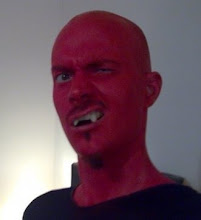The Hobbit: An Unexpected Journey
I enjoyed all three of Peter Jacksons Lord of the Rings films, despite the twee moments and length, but something about the first instalment of his Hobbit adaptation just didn’t do it for me.
Yes, the story was originally aimed more at children and wasn’t as much showcase for Tolkein’s passion for language and myth, but still it feels pretty simplistic and shallow.
Thorin seems a little one dimensional, Aidan Turner’s Kili oddly seems the only actor who make-up forgot to dwarf-up, most of the rest of the dwarven cast develop little personality beyond their look, Barry Humphries as the Goblin King took me away from the character, there’s the irritating singing and bumbling of the party sequence at Bags End and the final shot of Smaug awakening beneath his treasure pit has some abysmal CGI.
Having said that, Martin Freeman shines as the set-in-his-ways Bilbo who eventually grows into and adventurer, some of the action sequences are well made – the encounter with trolls and the escape from the goblins particularly, it’s always a pleasure seeing Ian McKellan, Sylvester McCoy is surprisingly good as Radagast and his sequences hinting at darker things are good, and finally Bilbo’s riddling with Gollum works, pulling out a feel of threat despite the short, skinny frame of the wasted hobbit.
Ultimately, this first part of the tale can’t quite match the grandeur of that first trilogy, and suffers from the lack of opportunity to flesh out some of the party without deviating from the original text. It’s enjoyable but just has little heft, though I am interested to see how the wizard side of things is developed in the next two parts.
The Game
The revelation I had after first watching the Game after its cinema release in 1997 was how could the plot make sense? How could this company put together such an elaborate set of events that seem so realistic – and then I realised, everything in the film was fake, was made up by a huge team of people coming together to create something believable, and the team within the film was no different (apart from everything having to work on ‘take one’ with a very specific audience of one).
Whilst the story is neat but shallow, dealing as it does with the world of the amazingly rich and their tribulations, the meat is in the telling, the twisting of main character Nicholas Van Orton’s perceptions and ramping paranoia, the setting and framing and shooting of the thing.
The fact that Fincher tended to work with different cinematographers for his first few films suggests that it was his vision that brought the colour washes that Soderbergh was also using - present in Alien 3, Seven and Fight Club, in The Game you still get sickly yellows and cool blues pulling the mood of a scene in the way that some directors/editors would need to have music to rely on.
The telling is still a little straighter than Fincher’s critically acclaimed classics, this feeling more of a straight studio thriller than his other films up until Benjamin Button, but Michael Douglas manages to get by on his star charm, playing a similar high-powered man to his turn in Wall Street, but without the passion, instead the film is draped around his blankness and lack, his routine showing how his power and wealth brings no great satisfaction.
The shallowness I noted earlier is in the re-hashing that money doesn’t buy happiness, instead having rich experiences and meeting people help you better value your life, though here that idea seems to be simultaneously repressed by immense wealth and facilitated by it.
This mixed message doesn’t stop the film entertaining as you try and second guess how far down the rabbit hole the plot will go and how real what seems to be happening actually is, but ultimately despite being better than the average slick Hollywood thriller it inevitably pales compared to Fincher’s work either side of the millennium.




0 comments:
Post a Comment